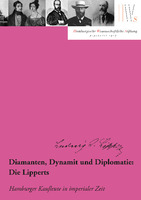Diamanten, Dynamit und Diplomatie: Die Lipperts. Hamburger Kaufleute in imperialer Zeit
Contributor(s)
Nümann, Ekkehard W. (editor)
Wissenschaftliche Stiftung, Hamburgische (editor)
Collection
AG UniverlageLanguage
GermanAbstract
As Hamburg merchants, the Lipperts have successfully traded with South Africa since the 1850s. As donators they have earned their living in their hometown for decades. The family's ancestor, David Lippert, came to Hamburg from Mecklenburg in the early 1830s. His marriage gave him access to the upper class - and a widely ramified family: The Hahns, the Robinows and the <a href="https://dx.doi.org/10.15460/HUP.MFW.9en.127">Beits</a> belonged to the next of kin, later also the Zacharias, Wibel, Bunsen, Bülau and Wentzel families.The focus of this publication is the life of three sons of David Lippert: the brothers Ludwig Julius (1835-1918), Wilhelm August (1845-1918) and Eduard Amandus (1844-1925). Ludwig belonged to the founding generation of the diamond industry in South Africa - and was one of the initiators of the Bismarck Monument at the Millerntor. William became consul in Cape Town just at the time when the Empire acquired "Deutsch-Südwest" ("German Southwest"), the first German colony. Eduard became an opponent of the British imperialist Cecil Rhodes in the Transvaal as a friend of President Paul Kruger. In Hamburg he was known as a patron of the observatory.The life of the three brothers as art collectors, founders, builders, landowners, rich in battles, blows of fate, defeats and victories is described for the first time in this dedicated publication of the series Mäzene für Wissenschaft of the Hamburgische Wissenschaftliche Stiftung.
Keywords
trade; merchant; funder; Germany; colony; history; 19th century; 20th centuryDOI
10.15460/HUP.MFW.20.181ISBN
9783943423457OCN
1083018267Publisher
Hamburg University PressPublication date and place
Hamburg, 2018Series
Mäzene für Wissenschaft, 20Classification
History


 Download
Download Web Shop
Web Shop